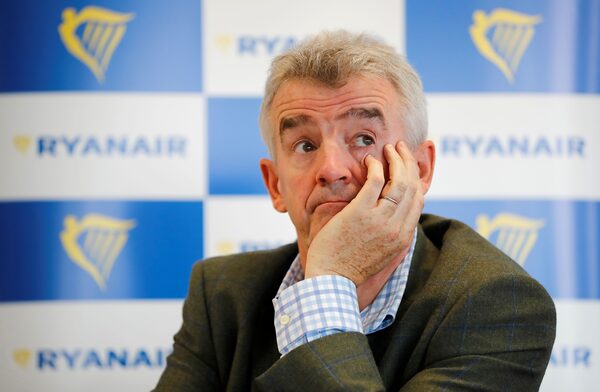
Ryanair CEO Michael O'Leary attends a news conference in London on Sept. 12, 2018, amid strikes by the airline's pilots and flight attendants that day in Germany.TOLGA AKMEN/AFP/Getty Images
Pilots and cabin crews at Ryanair DAC in Germany staged a full-day walkout on Wednesday and threatened further strikes as management at Europe’s largest low-cost carrier struggles to rein in an industrial-relations revolt.
The strike came a day before unions representing cabin crews in five countries – including No. 2 and 3 markets Italy and Spain – were due to announce whether to hold a joint strike later this month.
Chief executive Michael O’Leary was defiant, telling a media briefing in London that he was willing to accept strikes if that was the cost of defending the airline’s low-cost business model.
“We will not roll over every time we’re threatened with strikes,” he said. “We do not want strikes but we are willing to accept strikes, put up with them, if it means defending our cost base.”
He said strikes were having a minimal impact on overall operations and that full-year profit guidance was unchanged as it had already included some of the impact of the stoppages.
Shares in Ryanair reversed earlier modest losses, closing up 1.1 per cent on Wednesday.
The Ireland-based airline said it cancelled 150 of a total 400 flights scheduled to fly to and from Germany on Wednesday because of the strike and warned that such “wildcat” strikes would lead to job cuts if they continued.
The airline, which flies around 2,500 flights each day, said all passengers had been refunded or switched to other flights.
“As long as Ryanair does not make improved offers, there may have to be further strikes here,” said Ingolf Schumacher, a negotiator for German pilots union Vereinigung Cockpit (VC).
While both sides have agreed to employ a mediator, they have not agreed on who this should be. Ryanair has also come under fire for its practice of employing some pilots via third-party agencies, though it said all pilots will be directly employed by the end of the year.
Ryanair said its latest offer to Germany’s VC addressed all of the union’s demands and called the walkouts unreasonable.
In July it said it would move 20 per cent of its Dublin-based fleet to Poland due in part to the damage strike action was doing to bookings but reversed the decision last Friday.
German services union Verdi, which represents cabin crew, is seeking a substantial pay increase as well as local contracts for its members. It said management had, however, offered local contracts only from 2022.
At Germany’s biggest airport in Frankfurt, union members carried banners through a terminal, saying “Ryanair stop squeezing your crew.”
Mr. O’Leary did concede that the strikes had damaged customer confidence. “Our fares are undoubtedly a percentage point or two lower than they would otherwise be this summer,” he said.
The airline decided to recognize unions last December after a 30-year period in an attempt to improve relations with its pilots and ease a staffing crunch.
But failure to reach agreement with staff on conditions led to its worst ever strikes this summer.
Ryanair secured a breakthrough in August when it reached a deal with Irish pilots. But last week, seven trade unions representing Ryanair cabin crew in Italy, Portugal, Belgium, Spain and the Netherlands threatened to hold a strike in late September unless the airline agrees to improve working conditions.
Mr. O’Leary said the airline was making progress with unions in Spain, Portugal, Germany and the Netherlands. Local contracts remained a sticking point, he said, explaining that Ryanair’s hands were tied by Irish legislation on that matter. He said Ryanair was hopeful that the Irish government would change the rules.